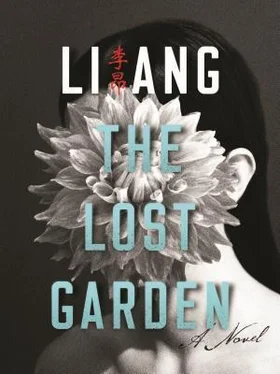Though Elixir did not supply hostesses, good-looking young women would come in and introduce themselves, passing out business cards with such job titles as “manager” or “deputy manager.” They poured drinks, served food, handed out towelettes, and toasted the guests. On this particular night four or five such women came and went the whole time. They sat quietly; except for toasting, they never started a conversation.
Still sober, the guests maintained a decorous appearance; no one groped the girls, since the real transactions had to be conducted outside. That was the rule for such occasions, one familiar to insiders.
Seasoned guests would never consider intimate contact with the girls here, though they didn’t mind having one they knew sit by them for a tête-à-tête. So after a “deputy manager” was asked to switch with someone else, Yinghong and Xigeng wound up sitting next to each other.
He sat smoking a cigarette, but failed to mask the smell of alcohol. Obviously, he’d had quite a bit to drink before coming to Elixir.
Focusing on their current location, he opened the conversation.
“In the past, nightclubs, singing halls, and drinking bars all had raised dance floors, creating a distance between the performers and the audience. Now, see how low the floor is? That’s so people can mingle and guests can go up to sing.”
She was at first disturbed by his familiarity with denizens of the red-light district, but he was so unpretentiously direct, with an ease that seemed to make any explanation unnecessary, that she turned to look.
They were in a private room, where the wall behind them was made of glass so the guests could look out at the dance floor. A degree of privacy, though, was maintained by frosted prints of long-tailed phoenixes.
Through the glass partition, she saw an ebony Steinway on the dance floor. A singer was leaning against the piano, singing a popular song that bemoaned a heart-rending romance in a soft, sad voice. Strobe lights in front of her twirled and spinned, creating a myriad of colors — soft pinks, greens, blues, and purples — as if enveloping a dream from which it was hard to awaken.
Obviously in high spirits, Lin went on and on about his latest project, a development along nearly two hundred feet of Dunhua South Road; it would be the classiest residential community in all of Taiwan, flats outfitted with imported, brand-name materials, from granite and flush toilets, to door handles and electric circuits.
He was dressed casually that night: tapered-leg blue jeans, a style that would soon be all the rage, and a green shirt with maroon stripes. A faint glint reflecting off the shirt told her that it was made of high-quality cotton, so exquisitely tailored that it had to have been created by a world-class designer. Highly animated, he couldn’t stop talking, a stark contrast to his low-key attitude at their first meeting. Now that the weariness and glum mood no longer showed on his face, he looked quite young.
He told her he’d come to Taipei before the age of twenty, with no money. He’d accepted an internship at an ad agency, where he’d worked on ads for real estate, which, he felt, was where Taiwan’s development potential lay. He put together some capital and, with the knowledge that land was the island’s most valuable resource, undertook some housing construction in Zhonghe, Xinzhuang, and Wanhua, before taking on the prized market of Taipei City.
She asked him how he had turned from real estate advertising to housing development.
“I witnessed a transformation in landowners who brought in builders to develop their land. In the beginning, they rode their bicycles to watch me create the ads. When the development was finished and they received their share of the flats, they came back to see me in their Mercedes.”
She looked up in surprise, her gaze falling on the phoenixes on the glass partition. Their layered tails, as recorded in legend, trailed behind them, free flowing and soaring. But the transparent glass rendered their original vibrant colors as misty white outlines. The pristine white of the phoenixes left room for imagination, lending a sense of wonder to the birds.
He chain-smoked as he talked about his past in the same casual tone he used to talk of his successes. While differing in content, they were equally unique.
He said he’d come from the countryside in the south, a place called Pujiao, probably known to few people in Taiwan. He was the oldest of seven kids. Reduced to extreme poverty during the early postwar era, like so many country folks, the family converted to Christianity.
It was never clear to him whether it was Catholic or Protestant Christianity, or the particular denomination; all he recalled was that there was a Jesus and the Virgin Mary. His mother took him to church to hear sermons and returned home with sacks of flour, which was why the villagers called their religion “Flour Christianity.”
He remembered how, when they returned home from the church, his mother would burn incense in front of the spirit tablets of their ancestors. Back then, Catholics, Protestants, and other religious adherents were allowed to keep the tablets of their ancestors; later, when there were enough believers, the rules changed and the practice was banned.
Their family also offered incense to a portrait, but he couldn’t tell whether it was the Guanyin Bodhisattva or Mazu, the fisherman’s patron saint. The portrait was carefully stashed in back of the spirit tablet, taken out only for worship, behind a closed door. They did not want the pastor or his wife to see them doing it.
He told her about the pants he’d worn as a child, made from American Aid flour sacks. There were blue symbols on them, but they were of no concern to him until he started school and learned that the blue symbols were a string of Arabic numbers and other unintelligible writing — serial numbers.
Taiwan’s economy stabilized slowly after the war; his family was still on the verge of starvation, but his parents insisted that he go on to middle school. Having no interest in studying, he dropped out of a senior vocational school and came to Taipei to seek his fortune.
Separated by the glass wall and the misty white phoenixes, the dance floor looked blurry and unreal under the lights. When she looked away, the twirling strobe lights stayed with her, giving her the impression that the glass wall was gone and leaving the pristine white phoenixes to fly in a void and float in the soft, bewitching lights. Though white phoenixes existed only in legend, amid the exquisite artificial ambience of Elixir, the wondrous could become real. The phoenixes seemed to stop in mid flight when she turned her head, before they faded into the pink miasma.
Yet in that small room infused with soft, pink light, where white phoenixes took flight, the typical business dinner went on, with men drinking and flirting and playing finger-guessing games with the girls next to them, while others displayed their talent at karaoke. It was the sort of entertainment that required no conversation, except for the occasional exchange of business information or political news, which needed few words. Since there was no need for talk, the host and guests did not have to interact, as they carried on with their unique way of socializing — bantering with girls or singing karaoke to amuse themselves. Xigeng and Yinghong were ignored, so they continued their talk with no concern for the others.
They had the ideal backdrop for their conversation — karaoke, alcohol, working girls, man-made soft lights and ambience, cool, perfume-infused air created for the occasion, and the elegant decor of the glass-partitioned room. Uninhibited enjoyment, so characteristic of these businessmen, and a direct arousal of the senses, provided a constant stimulant for drunken indulgence. The legend of white phoenixes seemed possible, even appropriate for a business dinner saturated with wondrous sounds, sensuality, alcohol, and women.
Читать дальше












